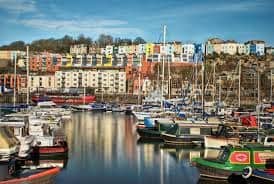In the early 1800s, rivers were a major transport method for getting people and goods around the country. Bristol grew up strategically placed at the point where the rivers Avon and Frome meet. At that point, it was far inland from any other ports which made it a convenient stopping point for ships coming in from outside of England.
Bristol has been around since before the year 1000 and it was formally named Bristol or ‘Bridge place’. Previously another town called Abonae, which was where the Romans had a port for trading existed.
In the 13th century, civil engineering was used to divert the river Frome and create a deep and wide artificial channel that would allow boats carrying goods to reach the port. This enabled building of the Quay, which was to become the harbour’s main wharf right through to the 19th century.

The importance of Bristol as a trade centre began to wane during the 1300s. Cloth woven in the Cotswolds was brought there for finishing and dyeing before being exported on a ship to Gascony, which is around 150 miles from Bordeaux. Bristol had a monopoly on red cloth. Ships would return from the region with wine.
For nearly two hundred years after the 1400s, the city of Bristol’s trade declined and traders had to look elsewhere for cargo. They expanded trading links with Spain and Portugal; the Baltic states; North Africa and the Mediterranean, but they were unable to break into Venice’s trade roadways. These discoveries led to the exploration of the ‘New World’ by sailing westward across the world (in contrast to all previous explorations that had taken place eastwards). This culminated in Cabot’s voyage in 1497, when he is thought to have discovered Newfoundland.
At the end of the 1600s, Bristol merchants broke into the lucrative trade market in Africa and began transporting trade goods, including guns and cooking pots. They would transport these to African traders across West Africa who would exchange these goods for slaves, who would then be transported to slave ports in England.
Slaves were sold at auctions to buy sugar, tobacco and other luxury goods that grew on plantations. At first, Bristol was the main port of trade but by the 1750s more merchants traded directly with the Caribbean, rather than transporting African people.
During this time, too, Bristol regained its place as the second most important port in the country and built up a prosperous trade. However, it was soon overtaken by Liverpool and other ports and soon had to concede its place.
After being created, the Floating Harbour allowed Bristol to expand as a port and flourish in the area of trade. But after a century, its significance started to decrease. Industrialisation in northern England helped other places grow faster.
By the 1830s, Isambard Kingdom Brunel’s shipbuilding business had been established and he built two ships in Liverpool – the paddle steamer Great Western and later the iron screw steamship.
It is a long-held tradition that ships were built in Bristol. Even today, some still follow this old tradition. The city once had the largest shipyard in the world but now ships are only built there occasionally.
In the 1870s, new docks were built on the Severn estuary at Avonmouth and Portishead to accommodate larger ocean-going ships. With their added capacity for loading and unloading cargo, these ports reduced transatlantic travel times and increased trade volumes.
The Port of Bristol’s prominence as a commercial port has ebbed and flowed. Avonmouth was developed greatly in the 1900s and became the primary shipping destination, but the Floating Harbour remained important up until it closed to commercial traffic in 1975.
The opening of the Royal Portbury Dock in 1977 created a lasting legacy for Bristol. Today, it remains one of the city’s key economic strengths.
If you’re currently experiencing issues in the workplace, you can speak with a Bristol-based solicitor for free employment law advice. The City is rich in history and you’ll never be short of things to do. The area boasts fantastic restaurants, superb nightlife and also one the England, oldest Universities, dating back to 1876!
